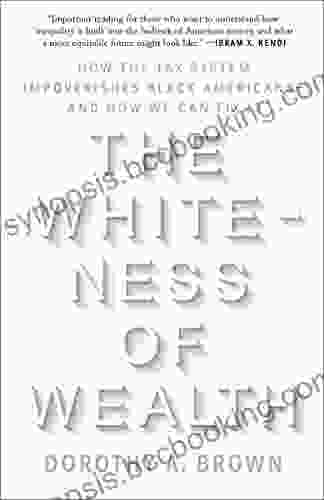Unmasking the Discriminatory Effects of the Tax System: A Revelation on How It Impoverishes Black Americans and the Path to Redemption

In the United States, the tax system has long been a contested terrain, with ongoing debates surrounding its fairness and equity. Amidst these discussions, a glaring disparity has emerged, echoing throughout the annals of history: the disproportionate burden it imposes on Black Americans. In his groundbreaking book, "How the Tax System Impoverishes Black Americans and How We Can Fix It," renowned economist and policy analyst William A. Darity Jr. sheds light on this systemic injustice, exposing the mechanisms that perpetuate racial wealth gaps and offering a transformative vision for reform.
Discriminatory Foundations: A Historical Legacy
The roots of tax disparities in America can be traced back to the nation's inception, embedded within the very fabric of its economic and social policies. Jim Crow laws, segregation, and redlining practices created barriers to homeownership, education, and job opportunities for Black Americans, leaving them disproportionately vulnerable to regressive taxes.
4.7 out of 5
| Language | : | English |
| File size | : | 3826 KB |
| Text-to-Speech | : | Enabled |
| Screen Reader | : | Supported |
| Enhanced typesetting | : | Enabled |
| X-Ray | : | Enabled |
| Word Wise | : | Enabled |
| Print length | : | 263 pages |
Compounding this historical disadvantage, the tax system itself has been designed in ways that exacerbate these disparities. For instance, regressive taxes, such as sales and property taxes, place a heavier burden on low-income households, which are more likely to include Black families. Additionally, tax breaks and deductions often favor high-income earners, further widening the racial wealth gap.
Erosion of Wealth: The Tax Code's Unintended Consequences
The impact of the discriminatory tax system on Black Americans is profound and multifaceted. One of the most insidious consequences is the erosion of wealth. Regressive taxes siphon away a disproportionate share of Black Americans' hard-earned income, leaving them with less capital to invest in homes, education, and other assets that can generate long-term wealth.
Furthermore, the tax code's preferential treatment of capital gains and dividends, which are predominantly enjoyed by the wealthy, further exacerbates the wealth gap. This disparity is compounded by the fact that Black Americans are less likely to own stocks or other assets that qualify for these favorable tax treatments.
Systemic Disparities: Beyond Income
The negative effects of the tax system on Black Americans extend far beyond income inequality. The disproportionate burden of regressive taxes undermines their ability to access essential services such as healthcare, education, and housing. This systemic disadvantage perpetuates a cycle of poverty and inequality that has long plagued Black communities.
For example, the high sales taxes imposed on goods such as diapers, feminine hygiene products, and groceries disproportionately impact low-income households, many of whom are Black families. Similarly, the lack of affordable housing is exacerbated by property taxes that make homeownership a distant dream for many.
A Path to Redemption: Reforming the Tax System
In the face of these systemic injustices, William A. Darity Jr.'s book offers a comprehensive blueprint for tax reform that aims to address the racial disparities embedded within the current system. Central to his vision is the concept of "progressive taxation," which shifts the tax burden from low- and middle-income households to those who can afford to pay more.
Darity proposes a series of specific policy recommendations, including:
* Increasing the earned income tax credit (EITC),which provides a refundable tax break to low- and moderate-income working families. * Expanding access to the child tax credit (CTC),which helps to offset the costs of raising children. * Reforming the mortgage interest deduction to make homeownership more affordable for first-time buyers and low-income families. * Closing loopholes that allow corporations to avoid paying their fair share of taxes.
Empowering Black Americans: A Call to Action
Darity's book is not merely an exposé of the tax system's discriminatory effects; it is a clarion call for change. By highlighting the systemic barriers faced by Black Americans, he empowers them to advocate for policies that will finally level the playing field.
The path to tax reform is not without challenges, but it is an imperative for racial justice and economic equality. By engaging in informed dialogue, advocating for progressive policies, and supporting organizations working to address these disparities, we can collectively dismantle the discriminatory structures that have long held Black Americans back.
"How the Tax System Impoverishes Black Americans and How We Can Fix It" is a groundbreaking work that sheds light on a critical but often overlooked aspect of racial inequality in America. By exposing the systemic biases and proposing transformative solutions, William A. Darity Jr. has sparked a national conversation on the need for tax reform that is both equitable and just. Together, let us embrace this call to action and work towards a future where the tax system is a force for empowerment, not impoverishment, for all Americans.
4.7 out of 5
| Language | : | English |
| File size | : | 3826 KB |
| Text-to-Speech | : | Enabled |
| Screen Reader | : | Supported |
| Enhanced typesetting | : | Enabled |
| X-Ray | : | Enabled |
| Word Wise | : | Enabled |
| Print length | : | 263 pages |
Do you want to contribute by writing guest posts on this blog?
Please contact us and send us a resume of previous articles that you have written.
 Book
Book Novel
Novel Page
Page Chapter
Chapter Text
Text Story
Story Genre
Genre Reader
Reader Library
Library Paperback
Paperback E-book
E-book Magazine
Magazine Newspaper
Newspaper Paragraph
Paragraph Sentence
Sentence Bookmark
Bookmark Shelf
Shelf Glossary
Glossary Bibliography
Bibliography Foreword
Foreword Preface
Preface Synopsis
Synopsis Annotation
Annotation Footnote
Footnote Manuscript
Manuscript Scroll
Scroll Codex
Codex Tome
Tome Bestseller
Bestseller Classics
Classics Library card
Library card Narrative
Narrative Biography
Biography Autobiography
Autobiography Memoir
Memoir Reference
Reference Encyclopedia
Encyclopedia Elizabeth Field
Elizabeth Field Gert Boyle
Gert Boyle Gina M Biegel
Gina M Biegel Walter Rhein
Walter Rhein Gary Galles
Gary Galles Greg Midland
Greg Midland Gary Mccord
Gary Mccord George B Schaller
George B Schaller Jason Sacks
Jason Sacks Noam Chomsky
Noam Chomsky Gesshin Claire Greenwood
Gesshin Claire Greenwood Gerry Donohue
Gerry Donohue Susan Buchholz
Susan Buchholz Stan Craig
Stan Craig Harley Mcallister
Harley Mcallister Gene Pease
Gene Pease Marlon Peterson
Marlon Peterson Geoffrey Ball
Geoffrey Ball Ed Gaulden
Ed Gaulden George Shannon
George Shannon
Light bulbAdvertise smarter! Our strategic ad space ensures maximum exposure. Reserve your spot today!

 Cristian CoxDevils, Gods, and Spirits of the Dictionnaire Infernal: Unveiling the Secrets...
Cristian CoxDevils, Gods, and Spirits of the Dictionnaire Infernal: Unveiling the Secrets... Jermaine PowellFollow ·3k
Jermaine PowellFollow ·3k Asher BellFollow ·3.3k
Asher BellFollow ·3.3k Ernesto SabatoFollow ·9.6k
Ernesto SabatoFollow ·9.6k Chad PriceFollow ·16.1k
Chad PriceFollow ·16.1k Peter CarterFollow ·18k
Peter CarterFollow ·18k Cortez ReedFollow ·6.9k
Cortez ReedFollow ·6.9k Cason CoxFollow ·18.2k
Cason CoxFollow ·18.2k Gordon CoxFollow ·4k
Gordon CoxFollow ·4k

 Robert Heinlein
Robert HeinleinUnveiling Humanism in China and the West: A Journey...
In our rapidly...

 Brian Bell
Brian BellBlind Boy's Unwavering Struggle Against Abuse and the...
In the tapestry of...

 Craig Carter
Craig CarterBuilding Wealth While Working for Uncle Sam: The Ultimate...
## ### Are you a federal employee who wants...

 Raymond Parker
Raymond ParkerUnveiling the Secrets of Arabic Survival: The Ultimate...
Embarking on a journey to unravel the...
4.7 out of 5
| Language | : | English |
| File size | : | 3826 KB |
| Text-to-Speech | : | Enabled |
| Screen Reader | : | Supported |
| Enhanced typesetting | : | Enabled |
| X-Ray | : | Enabled |
| Word Wise | : | Enabled |
| Print length | : | 263 pages |














